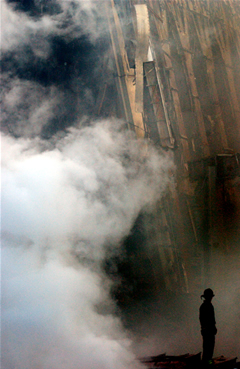Remembering 9/11:
Political Blowback or Divine Judgment?
For Sunday September 16, 2007
Lectionary Readings (Revised Common Lectionary, Year C)
Jeremiah 4:11–12, 22–28 or Exodus 32:7–14
Psalm 14 or Psalm 51:1–10
1 Timothy 1:12–17
Luke 15:1–10
 |
Over Labor Day weekend 2001 I took my son to New York City to celebrate his beginning of high school. We saw Phantom of the Opera, rode the subway to a Mets baseball game, and took a windy boat-ride to the Statue of Liberty. As the boat returned to Battery Park we snapped photos of the iconic 110-story World Trade Center. When its twin towers were completed in 1972–1973 they were the tallest buildings in the world. They even had their own zip code (10048), and on a normal workday they welcomed 200,000 workers and visitors.
One week later, on September 11, nineteen Al-Qaeda terrorists hijacked four commercial airliners in a coordinated suicide attack. One plane slammed into the North Tower of the WTC, another into the South Tower, a third one plowed into the Pentagon, and a fourth plane that was targeted for the US Capitol crashed in rural Pennsylvania after passengers wrestled control from the hijackers. 2,974 people died in the carnage, including 343 firefighters and 60 police officers. 24 people are still missing. Although he first denied any responsibility, on October 30, 2004 Osama bin Laden said that he had directed the attacks.
Six years later Americans still struggle to understand why Al Qaeda attacked us. What sort of narrative best interprets the tragedy? Can we identify a cause or reason for the attacks? That's a delicate task. We should be careful not to blame the innocent. No nation "deserves" a terrorist attack against its civilians, least of all the victims and their families. But that's different than searching for an explanation to make sense of what happened.
In one view, the attackers were motivated by their hatred of our western values—democracy, religious pluralism, freedom of speech, freedom to vote, and toleration of dissent. In this black-and-white view there's no middle ground or ambiguity; nations are "either for us or against us." On one side there's an "axis of evil" that wills us harm, and on the other side enlightened people who champion the true, the good, and the just. But if Muslims hate our secular, liberal values, why do they want to come to the west? And why export our alien values to their lands at the barrel of a gun? There might be some elements of truth in this view, but I don't find it compelling.
 |
A solitary firefighter at Ground Zero on 9/11.. |
Another view examines the consequences of American foreign policy. A 1998 fatwa by Osama bin Laden and others objected not to our values but to three specific "crimes and sins"—our support for the United Nations sanctions against Iraq (1990–2003) that hastened the deaths of a million citizens (UNICEF says that 500,000 children died as a result of the sanctions), our biased support for Israel to the detriment of Palestinians, and the presence of our numerous military bases in their sacred Muslim lands. The fatwa also mentioned America's plundering of Arab resources, support for abusive regimes, and undermining self-determination by dictating policy.
In this second view the 9/11 attacks were a classic case of "blowback." Blowback, says Chalmers Johnson, is "another way of saying that a nation reaps what it sows." The term first appeared in a 1953 CIA document about America's overthrow of the democratically-elected prime minister Mohammad Mossadegh of Iran who wanted to nationalize Iran's oil industry (which until then had been controlled by what later became British Petroleum). "Blowback" described the unintended consequences of our covert operations and foreign policies.
What many people around the world "hate" about America, Johnson argues, is our global militarism and predatory economic policies which virtually assure retaliations against us for decades to come. Instead of acting prudently, we have acted with what has become predictable condescension towards other nations and with myopia about the consequences. Our overwhelming and global military-economic threat, exercised with almost no fear of retaliation, is "seeding resentments that are bound to breed attempts at retaliation."
In addition to the human factors of politics, history, economics, religion and culture, should Christians appeal to God's providential intervention to explain the terrorist attacks? No less than an Abraham Lincoln described the Civil War as God's judgment on America for slavery. What role, if any, did God play in the 9/11 attacks? Angering Muslim extremists with an imprudent foreign policy is bad enough. Angering God himself would be calamitous.
Jerry Falwell construed the 9/11 attacks as divine punishment. On his nationally televised program he claimed that the wickedness of pagans, abortionists, feminists, gays, lesbians, the ACLU, and People for the American Way were one reason God had punished America. “I point the finger in their face,” said Falwell, “and say, ‘you helped this happen.’” Pat Robertson, a guest on the show, nodded in agreement, saying, “well, I totally concur.” In Falwell's view, America's policies aren't wrong because they're politically imprudent as a matter of practice. Rather, they're morally wrong as a matter of principle because they violate God's standards.
It would be convenient to dismiss Falwell's remark as reckless and hateful (which it is). But that would obscure an important truth. The Hebrew Scriptures from Exodus and Jeremiah this week unambiguously affirm that Yahweh intervenes not only in the lives of individuals but in the affairs of nations, and that he sometimes judges nations with "disaster upon disaster" (Jeremiah 4:12, 15, 20; Exodus 32:14). Falwell was right that God judges nations, but wrong about where he assigned the blame.
The Exodus story specifies idolatry as Israel's undoing. Their downfall was religious idolatry, but you can "idolize" anything when you absolutize the relative and then offer your unconditional allegiance to it—money, sex, work or family. I wonder about American political idolatry. The thirty-three page National Security Strategy (2002), for example, praises American democratic capitalism as the "single sustainable model for national success," and "right and true for every person in every society." Therefore we intend to export our way of life "to every corner of the globe." The NSS also says that we'll act unilaterally and pre-emptively against any nation that tries to thwart us. I cringe to imagine how the 192 member states of the UN hear such pompous pronouncements. I also wonder what the Lord who shows no favoritism but welcomes all peoples (Acts 10:34–35) thinks about our pretensions.
Nevertheless, caution is in order. There are many reasons why we should be reluctant to link divine judgment and national disaster, whether for America or for any nation. It's one thing to affirm that God acts in the hisory of nations, but quite another to claim to know exactly how, when, where, or why.
 |
Osama bin Laden. |
No nation is purely good or evil, but instead a mix of both. A nation's ordinary citizens often hold opinions far removed from the megalomania of its political leaders. Jesus warned against linking human tragedy and divine judgment (Luke 13:1–5). Isaiah reminds us that the ways of an infinite God transcend the minds of finite humans (Isaiah 55:8). In his review of the book God's Judgments; Interpreting History and the Christian Faith (2007) by Steven Keillor, Brad Gregory of Notre Dame offers wise counsel: "Claims of divine providence and divine judgment are at a minimum empirically unverifiable, if not also naive, irresponsible, and dangerous."
We should not wish divine judgment on anyone or any nation; we should wish them God's shalom. When you imagine that God hates all the people you hate, then you can be sure you've created him in your own image. No, said the German pastor Martin Niemoeller who was imprisoned by Hitler for eight years (1937–1945), "God is not the enemy of my enemies; he's not even the enemy of his own enemies."
The Hebrew story from Exodus makes a final and decisive point: divine judgment is not pre-determined. God's will is not some irresistible and implacable destiny, as if he were a puppeteer pulling strings. Instead, history is open and fluid, a mysterious interplay of divine mercy and human choices. Israel was idolatrous, but Moses "sought the favor of the Lord his God." As a result, "the Lord relented and did not bring on his people the disaster he had threatened" (Exodus 32:11, 14). That's an outcome for which we can all pray, all the time, for all the nations of the world.
For further reflection:
* From Lincoln's Second Inaugural Address on March 4, 1865 (italics added): " . . . The Almighty has His own purposes. "Woe unto the world because of offenses; for it must needs be that offenses come, but woe to that man by whom the offense cometh." If we shall suppose that American slavery is one of those offenses which, in the providence of God, must needs come, but which, having continued through His appointed time, He now wills to remove, and that He gives to both North and South this terrible war as the woe due to those by whom the offense came, shall we discern therein any departure from those divine attributes which the believers in a living God always ascribe to Him? Fondly do we hope, fervently do we pray, that this mighty scourge of war may speedily pass away. Yet, if God wills that it continue until all the wealth piled by the bondsman's two hundred and fifty years of unrequited toil shall be sunk, and until every drop of blood drawn with the lash shall be paid by another drawn with the sword, as was said three thousand years ago, so still it must be said "the judgments of the Lord are true and righteous altogether. . . . "





